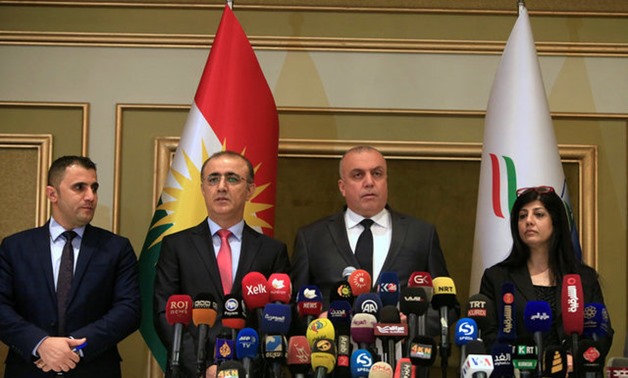
The High Elections and Referendum Commission holds a press conference in Erbil - REUTERS
BAGHDAD/ERBI - 27 September 2017: Baghdad piled pressure on Iraq's Kurds on Wednesday, demanding they cancel their overwhelming vote for independence while parliament urged the Iraqi central government to send troops to take control of vital oil fields held by Kurdish forces.
Stepping up efforts to isolate autonomous Kurdish-held northern Iraq, which backed secession in a referendum on Monday that angered neighboring countries, Baghdad demanded that foreign governments close their diplomatic missions in the Kurdish capital, Erbil.
Final results released on Wednesday showed nearly 93 percent in favor of independence, and 7.3 percent against. More than 3.3 million people, or 72 percent of eligible voters, took part in Monday's ballot, according to the electoral commission.
The referendum has fuelled fears of a new regional conflict. A delegation from Iraq's armed forces headed to neighbouring Iran to coordinate military efforts, apparently as part of retaliatory measures taken by the government in Baghdad following the vote.
Iran and Turkey also oppose any move towards Kurdish secession and their armies have started joint exercises near their borders with Iraqi Kurdistan in recent days. Iraq and Turkey have also held joint military drills.
Foreign airlines began suspending flights to Kurdish airports after the Iraqi Civil Aviation Authority said international flights to Erbil and Sulaimaniya would be suspended at 1500 GMT on Tuesday.
Kurdish authorities rejected Baghdad's demands that they should annul the referendum as a condition for dialogue and hand over control of their international airports.
Turkey, which has threatened to impose sanctions on the Kurds, said its border with northern Iraq remained open, although it may not remain so. The number of trucks passing through had however decreased.
TURKISH FEARS
Home to the region's largest Kurdish population, Turkey has been battling a three-decade insurgency in its largely Kurdish southeast and fears the referendum will inflame separatist tension at home.
Turkish President Tayyip Erdogan and Russian President Vladimir Putin, who have stressed the need for Iraq's borders to remain unchanged, will meet in Ankara on Thursday.
Russia's interest in the region is growing. Oil major Rosneft is increasing investment in Kurdistan and the Kurds have been developing strong ties with Moscow.
The Russian Foreign Ministry warned Iraq and the Kurds against taking any steps that might destabilise the Middle East after the referendum,
The Kurds consider Monday's referendum to be an historic step in a generations-old quest for a state of their own.
Iraq considers the vote unconstitutional, especially as it was held not only within the Kurdish region itself but also on disputed territory held by Kurds elsewhere in northern Iraq.
The United States, major European countries and neighbours Turkey and Iran strongly opposed the referendum, which they described as destabilising at a time when all sides are still fighting against Islamic State militants.
Iraqi Kurdish leader Masoud Barzani announced on Tuesday evening that the "yes" vote had won.
The outcome has caused anger in Baghdad, where parliament, in a session boycotted by Kurdish lawmakers, asked Prime Minister Haider al-Abadi to send troops to the Kurdish-held region of Kirkuk to take control of its oilfields.
Kurdish Peshmerga forces took Kirkuk, a multi-ethnic region, in 2014 when the Iraqi army fled in the face of Islamic State militants who overran about a third of Iraq. The Kurds prevented Kirkuk's huge oil resources from falling into the militants' hands.
"The government has to bring back the oilfields of Kirkuk under the control of the oil ministry," the resolution backed by parliament in Baghdad said.
The area, long claimed by the Kurds, is also home to Turkmen and Arab communities, who opposed the independence vote, although the Kurdistan Regional Government (KRG) included the area in the referendum.
MANDATE FOR NEGOTIATIONS
Barzani, who is KRG president, has said the vote is not binding, but meant to provide a mandate for negotiations with Baghdad and neighbouring countries over the peaceful secession of the region from Iraq.
Baghdad has rejected talks.
Abadi, a moderate from Iraq's Shi'ite Arab majority, is under pressure to take punitive measures against the Kurds. Hardline Iranian-backed Shi'ite groups have already threatened to march on Kirkuk.
The Kurds were left without a state of their own when the Ottoman empire crumbled a century ago. Around 30 million are scattered in northern Iraq, southeastern Turkey and parts of Syria and Iran.
The autonomous region they control in Iraq is the closest the Kurds have come in modern times to a state. It has flourished, largely remaining at peace while the rest of Iraq has been in a continuous state of civil war for 14 years.
Since the fall of Saddam Hussein, they have had to carefully balance their ambitions for full independence with the threat of a backlash from their neighbours and the reluctance of Washington to redraw borders.
In the past four years they achieved a measure of economic independence by opening a route to sell oil through pipelines to a port in Turkey. But that still leaves them at the mercy of Ankara, which draws a firm line at formal independence.
The Kurds say the referendum acknowledges their contribution in confronting Islamic State after it overwhelmed the Iraqi army in 2014.
Iraq's Kurds have been close allies of the United States since Washington offered them protection from Saddam in 1991. But the United States has long encouraged the Kurds to avoid unilateral steps so as not to jeopardise the stability of Iraq or antagonise Turkey.
The U.S. State Department said it was "deeply disappointed" by the decision to conduct the referendum, while the European Union regretted that the Kurds had failed to heed its call not to hold the vote.

Comments
Leave a Comment